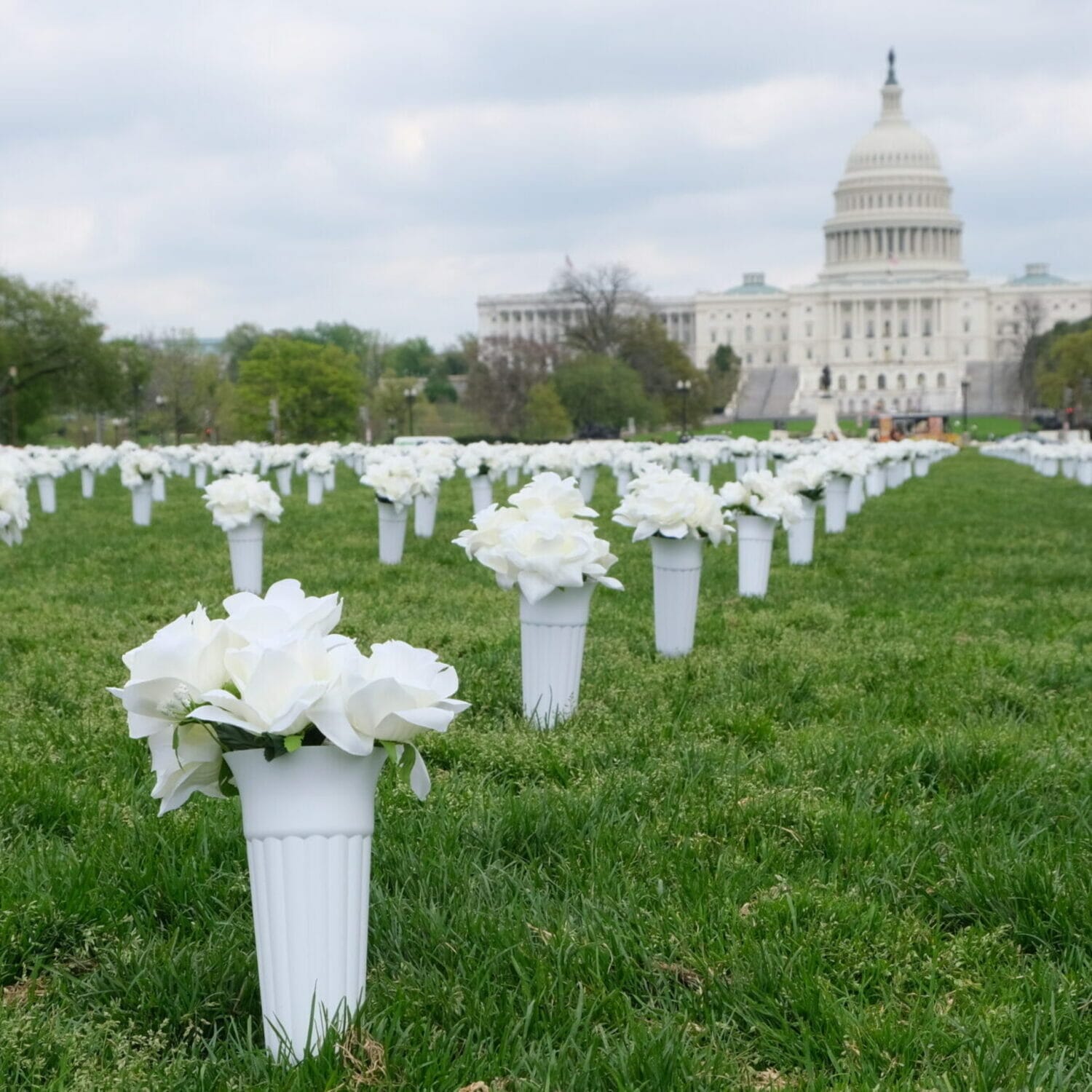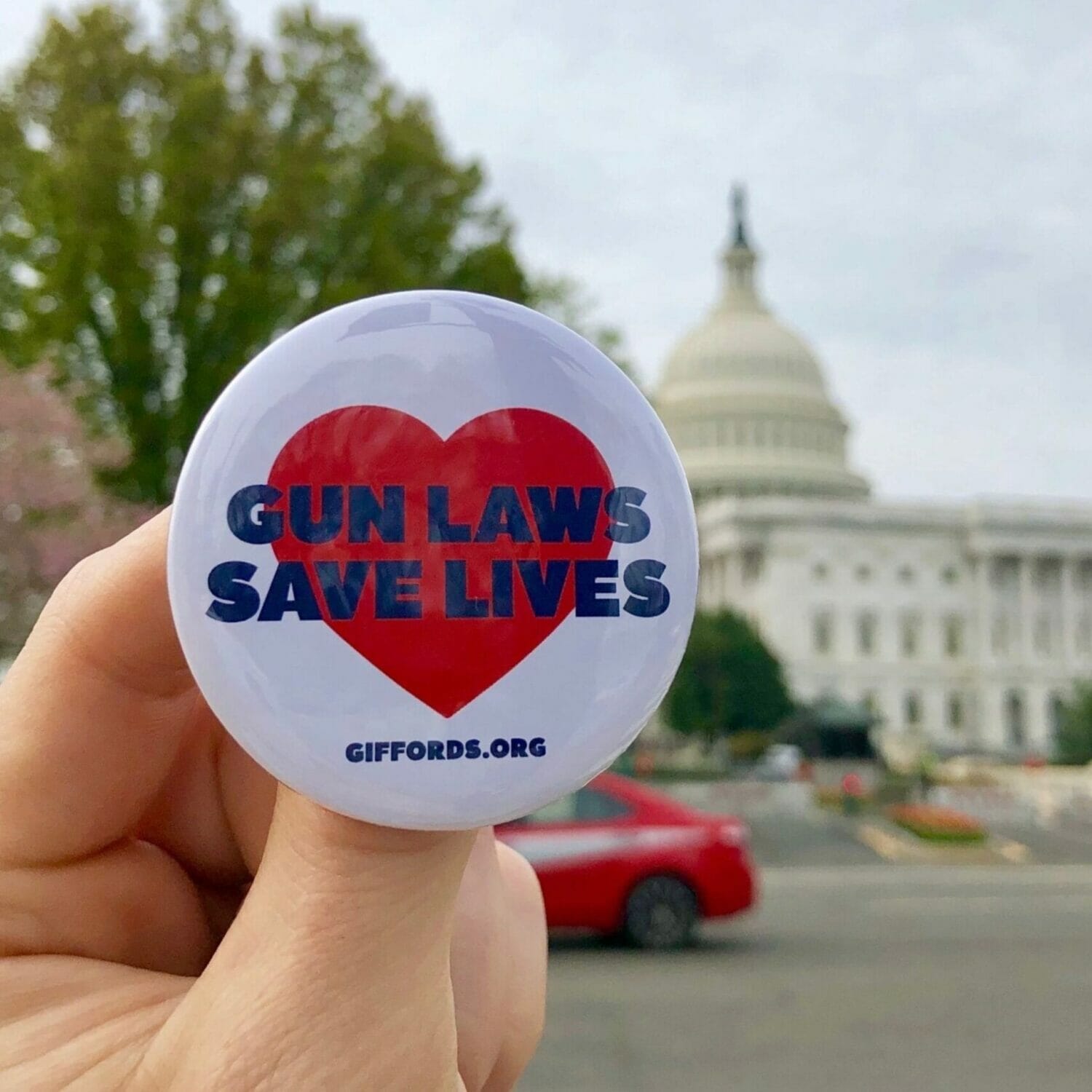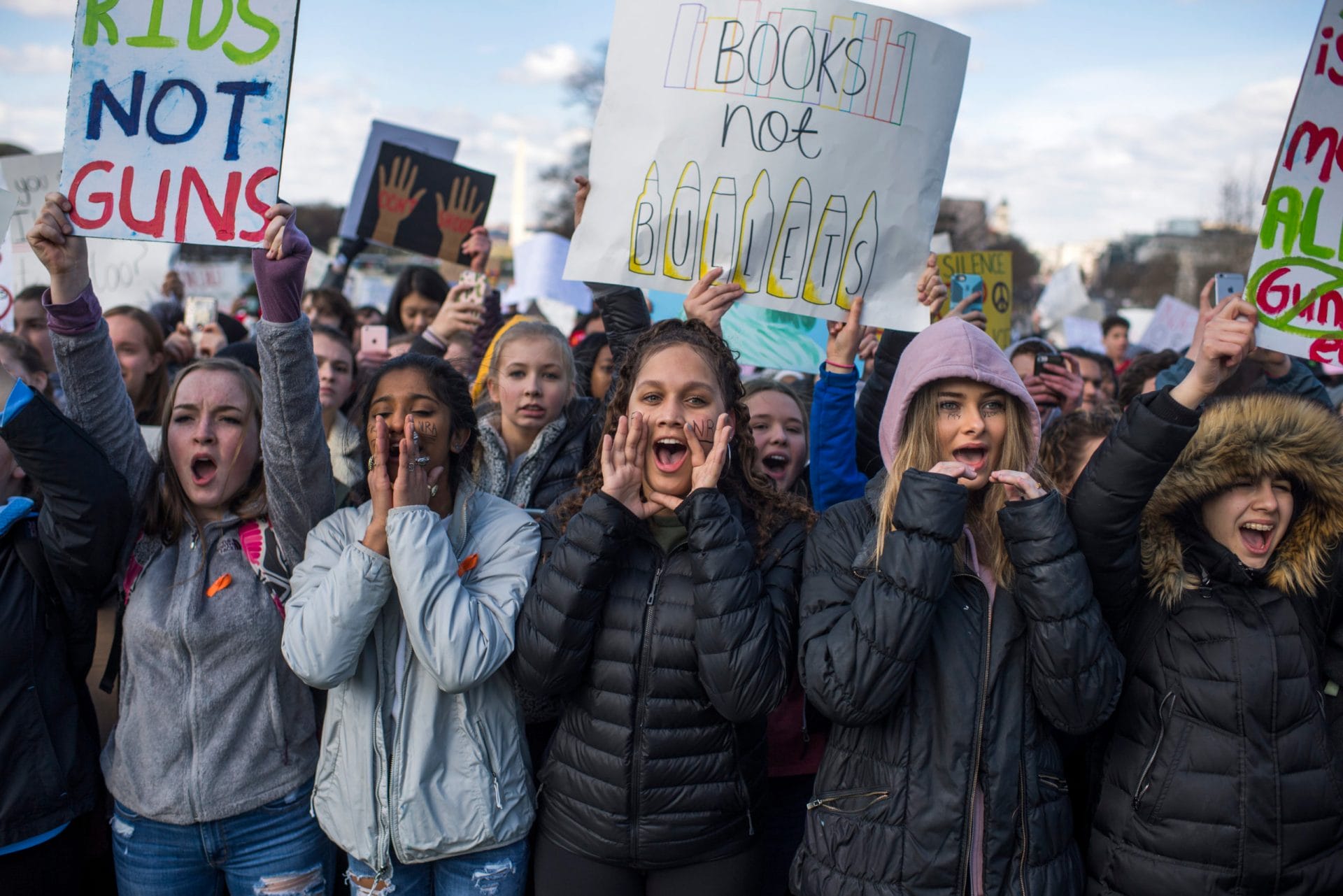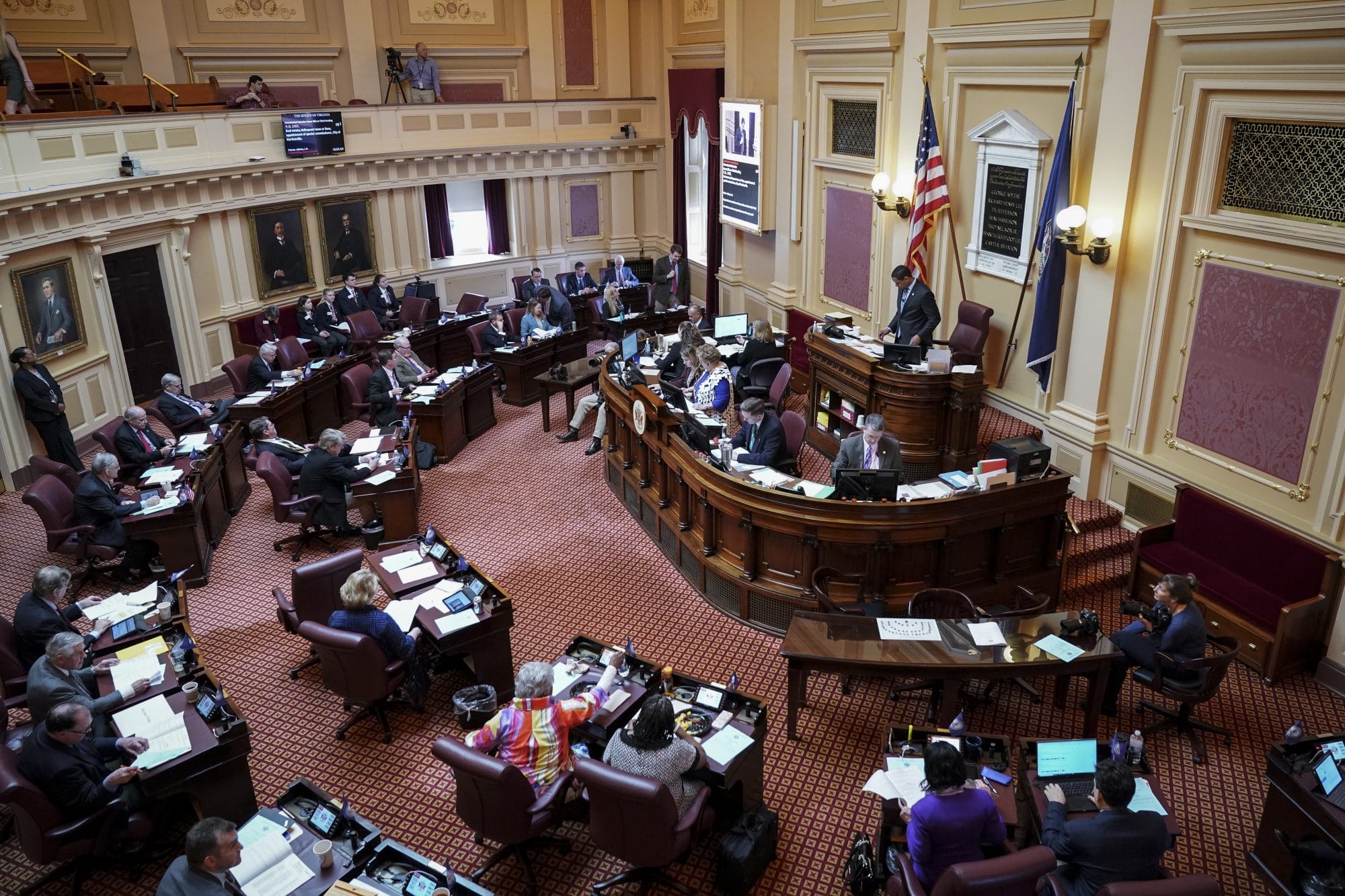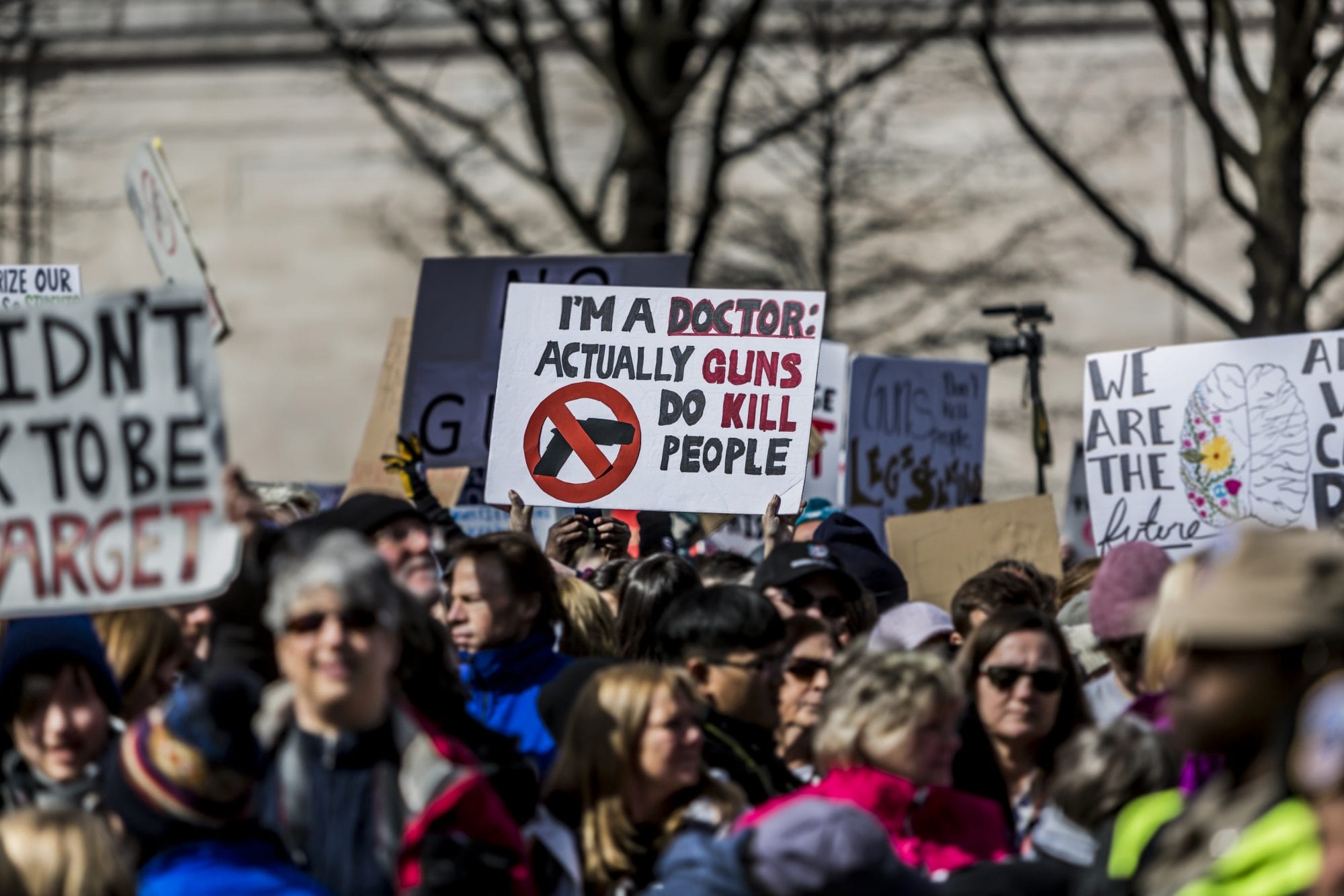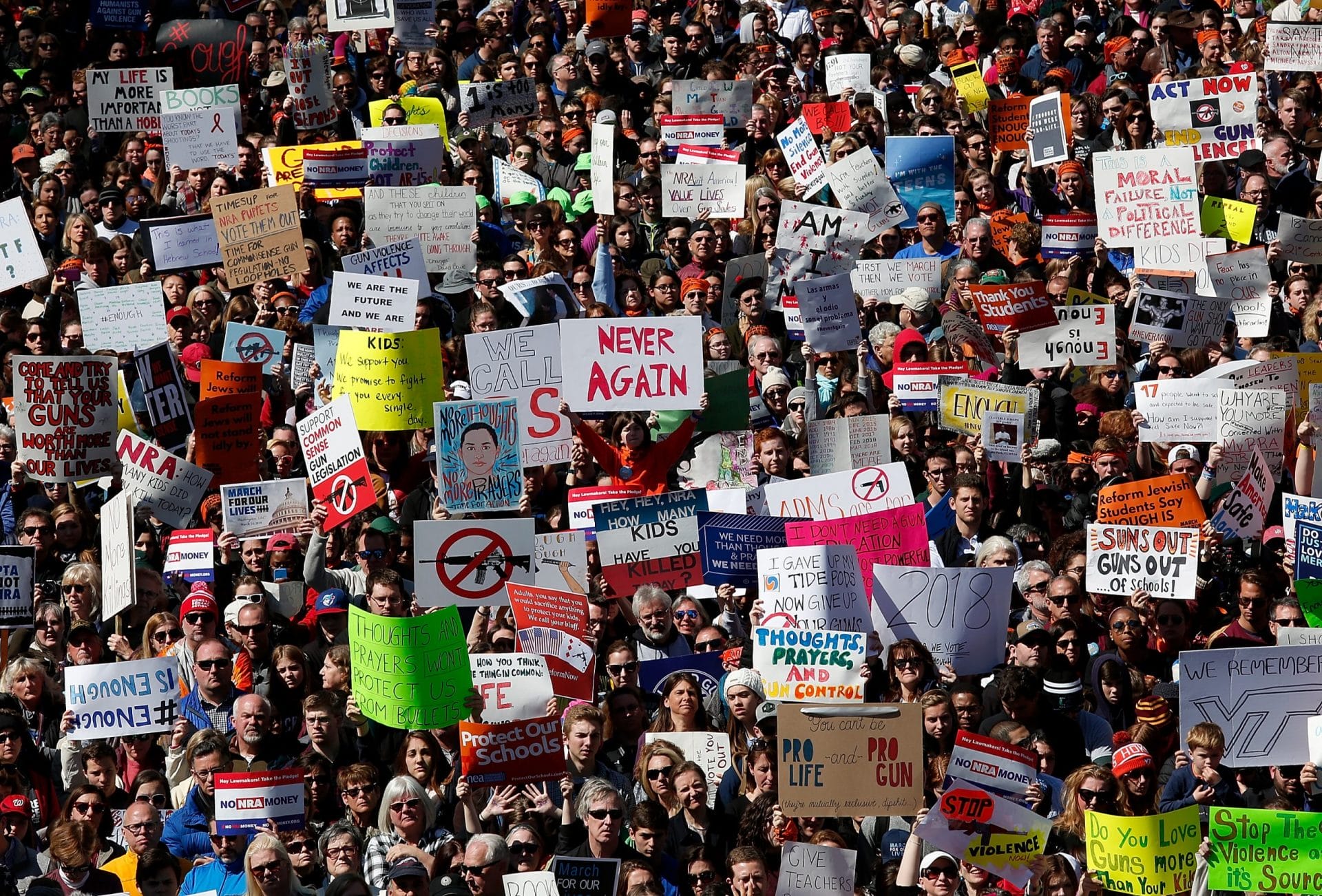
Giffords Law Center Gun Law Trendwatch: February 14, 2023
A Roundup and Analysis of the Latest State Firearm Legislation
Five Years Ago, the Parkland Shooting in Florida Sparked Bipartisan Efforts—Yet Such Consensus Still Proves Rare
Every other week during the state legislative cycle, Gun Law Trendwatch breaks down trends in the gun violence prevention universe. We take an in-depth look at a topic of particular interest to legislators and advocates—this week it’s the party divide on gun safety policies in states across the country—and provide updates on significant gun safety and gun lobby bills as they move through state legislatures.
State of the States
While Public Support for Gun Safety Policies Has Increased, It Remains a Largely Partisan Issue amongst Elected Officials
On this day five years ago, a deeply troubled 19-year-old armed with a legally purchased assault weapon massacred 14 students and three staff members at a high school in Parkland, Florida. In response, several states with Republican governors signed gun safety bills including universal background checks and extreme risk protection orders (ERPOs).
In the intervening years, support for a wide range of gun violence prevention policy has grown among most Americans, including a majority of gun owners and about half of Republicans. While gun safety remains a largely partisan issue amongst elected officials, in state legislatures with trifecta-Democrat control, gun violence prevention has become a top priority.
Voters in Nevada, Colorado, and Virginia gave control of all three branches of state government to Democrats in 2016, 2018, and 2019, respectively. The states immediately passed evidence-based, effective policies including: universal background checks, domestic violence gun laws, ERPOs, child access prevention laws, and preemption repeal.
In 2021, Virginia elected a Republican governor who is extreme on guns, and the tremendous progress it was making towards saving lives ground to halt. Similarly, in recent years, states with Republican trifecta control, such as Ohio, Texas, Iowa, and Missouri, have repealed laws requiring background checks on gun purchases and people carrying guns in public, enacted Stand Your Ground laws that have been shown to increase racist violence, and made their law enforcement officers civilly liable for helping to enforce federal gun laws.
In 2023, we are seeing the same trends unfold. Michigan and Minnesota flipped to Democrat control during the 2022 midterm elections and, consequently, are determined to pass the foundational gun safety policies their states have neglected for so long: ERPOs, background checks, child access prevention, lost and stolen reporting, and domestic violence gun laws, among others. Florida, however, is planning to eliminate the permit and background check to carry concealed firearms in public.
While the gun violence prevention movement continues to try to persuade elected Republicans to vote for the gun safety policies desired by a majority of their constituents, Americans determined to make progress on this issue will ensure their voices are heard at the ballot box.
JOIN THE FIGHT
Gun violence costs our nation 40,000 lives each year. We can’t sit back as politicians fail to act tragedy after tragedy. Giffords Law Center brings the fight to save lives to communities, statehouses, and courts across the country—will you stand with us?

Gun Safety Spotlight
States Are Fighting Back against the Gun Industry’s Decades-Long Efforts to Shield Itself from Liability
Victims’ access to justice laws are sweeping across states with gun safety majorities. These laws are intended to allow survivors of gun violence to sue gun industry members who behaved recklessly or irresponsibly with regards to the sale or marketing of guns. Although it seems common sense to allow such lawsuits, the gun industry has been adept at preventing them in the past.
Gun Safety Recommendations for the 118th Congress
Jan 30, 2023
In 2005, Congress passed the Protection of Lawful Commerce in Arms Act (PLCAA), a federal law that provides gun industry members broad immunity from many lawsuits—a protection most consumer products makers do not enjoy. PLCAA has been used to shield gun industry members such as Lucky Gunner, a retailer that sold thousands of rounds of ammunition and a 100-round magazine to a disturbed young man who killed 12 people at a movie theater in Aurora, Colorado, in 2012. Thanks to PLCAA, the parents of a woman killed in the shooting not only lost their case against Lucky Gunner, but were bankrupted when they were required to pay the dealer’s $200,000 legal fees.
Importantly, however, PLCCA provides certain exceptions to its general immunity, authorizing lawsuits against a defendant who has knowingly violated a specific state law that regulates the sale and marketing of firearms. Many plaintiffs have tried to use this exception to sue dealers like Lucky Gunner and others, but there has been significant litigation over whether state laws qualify for this exception.
Accordingly, several states are now passing laws that expressly create a firearm industry standard of conduct that unambiguously qualifies as an exception to PLCCA immunity. In 2022, California, Delaware, New Jersey, and New York enacted these laws that allow victims of gun violence access to the justice they have, for so long, been wrongly denied.
Serious efforts are underway in Colorado, Illinois, Maryland, Massachusetts, New Mexico, and Washington to enact these policies this year.
Gun Lobby Extremism
Gun Friendly States Aim to Shut Down Corporate Gun Violence Prevention Efforts
According to Forbes, 80% of consumers want the brands they buy to have a social purpose—such as gun violence prevention. In addition to pleasing their customers, businesses also have an economic incentive to reduce gun violence.

The annual cost of gun violence in America
Source
Everytown Research & Policy, “The Economic Cost of Gun Violence,” Everytown for Gun Safety, July 19, 2022, https://everytownresearch.org/report/the-economic-cost-of-gun-violence/.
According to BSR, a sustainability business consultant that counts Meta and Google among its clients, gun violence costs employers $1.4 million every day. Gun violence that takes place at work also exposes employers to liability. These reasons and more are why all sorts of companies are getting involved in gun violence prevention.
However, when some banks and public funds refused to continue financing makers of assault weapons or began divesting from gun companies, states led by gun zealots rushed to prohibit doing business with them. In 2021, Texas and Wyoming passed bills to prohibit local governments from entering into contracts with financial institutions that “discriminate” against the firearm industry. Louisiana began enforcing this policy without legislation.
So far in 2023, bills have been introduced in Arkansas, Colorado, Iowa, Missouri, Montana, North Dakota, Oklahoma, South Carolina, and West Virginia to abridge the free speech rights guaranteed to corporations by the Supreme Court with legislation similar to Texas’s and Wyoming’s. In addition to unconstitutionally restricting the First Amendment rights of corporations, this move is bad for state taxpayers, forcing the state to enter into more expensive contracts with lenders. Gun extremism never pays.
MEDIA REQUESTS
Our experts can speak to the full spectrum of gun violence prevention issues. Have a question? Email us at media@giffords.org.
Contact
Bills in Motion
Lawmakers intent on protecting their constituents from gun violence began 2023 with the introduction of hundreds of gun violence prevention bills. Notably, bills to strengthen background check requirements, fund proven community violence intervention programs, improve domestic violence prohibitions, and regulate or prohibit ghost guns have been introduced in at least 27 states and the District of Columbia. Gun extremists nevertheless continue to push their dangerous agenda of more guns to address gun violence and have introduced several bills to bring guns in schools, allow permitless carry, allow people to shoot first and ask questions later, and make law enforcement officers liable for enforcing federal gun laws in over a dozen states. For nearly 30 years, we have helped states make our communities safer with evidence-based policies and by fighting the gun lobby. In 2023, we are stronger than ever.
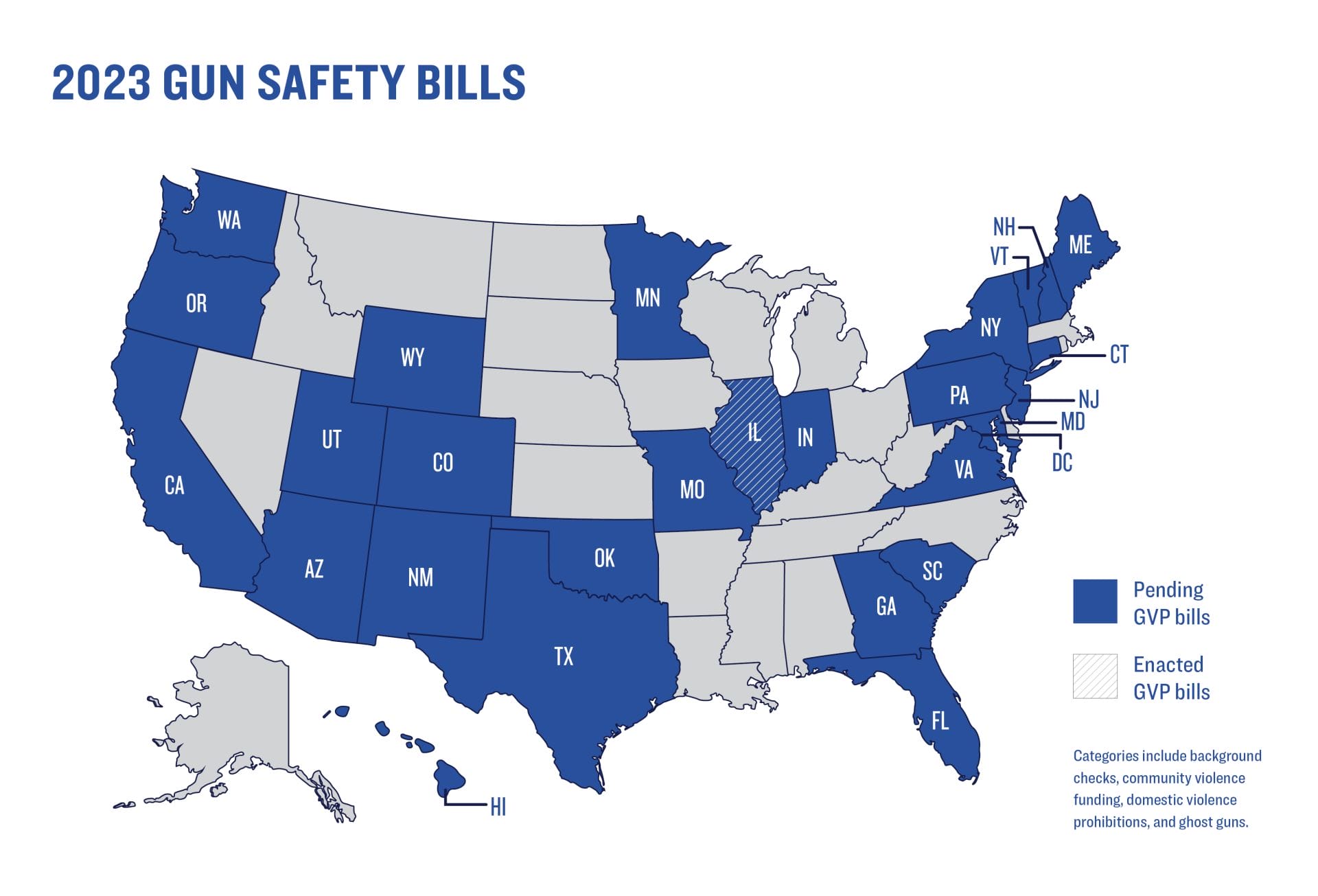
Gun Safety Bills
- BACKGROUND CHECKS: Minnesota HB 14 had a hearing scheduled on 2/9. New Hampshire HB 59 was heard in committee on 2/8. Washington HB 1143 had a hearing on 2/8 and SB 5232 had a hearing on 2/9. Utah HB 226 passed its chamber of origin. Washington HB 1143 passed a committee. At least 12 states have bills pending that would enact universal background checks or strengthen existing laws.
- COMMUNITY VIOLENCE: Illinois HB 969 (2021) was enacted on 1/24. Connecticut HB 5653 had a hearing on 2/6. Minnesota HB 25, New Jersey SB 3086, New York SB 580, and Virginia HB 1400 and SB 800 all passed a committee. At least 13 states have bills pending that allocate, protect, or administer funding for evidence-based violence prevention programs.
- DOMESTIC VIOLENCE: Vermont SB 4 was scheduled to be heard on 2/10. Washington HB 1562 had a hearing on 2/7. District of Columbia B24-0760 has been sent to Congress. New Mexico SB 18 and Washington SB 5231 have passed a committee. Wyoming SB 120 has passed its chamber of origin. At least 14 states have bills pending that would improve efforts to keep guns out of the hands of people who commit domestic abuse.
- GHOST GUNS: District of Columbia B24-0760 has been sent to Congress. Virginia SB 1181 has passed its chamber of origin. At least eight states have bills pending that regulate ghost guns or improve the effectiveness of their ghost gun policies.
Gun Lobby Bills
- GUNS IN SCHOOLS: Arizona SB 1331 was scheduled to have a hearing on 2/8. Mississippi HB 532 passed a committee. Dangerous bills to allow or expand the ability to carry guns in school or on campus are pending in at least 12 states.
- PERMITLESS CARRY: Florida HB 543 and New Mexico HB 164 were scheduled to be heard on 2/7. Maryland HB 364 had a hearing scheduled for 2/8. There are reckless permitless carry bills pending in at least seven states.
- STAND YOUR GROUND: Bills that make it easy to use deadly force in public and evade justice are pending in at least nine states.
- LIABILITY FOR ENFORCING GUN LAWS: New Hampshire HB 474 was scheduled to be heard on 2/8 and has a hearing scheduled for 2/16. Bills that would make law enforcement officers or other state and local government officials personally liable, or otherwise impose onerous penalties on law enforcement agencies or localities, for enforcing federal gun laws are pending in at least 10 states.
HERE TO HELP
Interested in partnering with us to draft, enact, or implement lifesaving gun safety legislation in your community? Our attorneys provide free assistance to lawmakers, public officials, and advocates working toward solutions to the gun violence crisis.
CONTACT US
